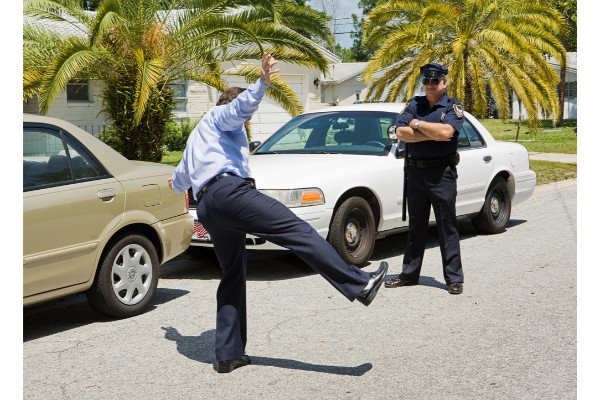Field Sobriety Tests: What You Need to Know

You have probably heard about field sobriety tests that police officers give suspected drunk drivers during traffic stops. Beyond walking in a straight line and touching your finger to your nose, there is much more to know about the Oklahoma standardized field sobriety tests (SFSTs).
Which Tests Do Police Officers Give?
The police in Oklahoma give three SFSTs to drivers: the Horizontal Gaze Nystagmus Test (“Pen Test”), the Walk and Turn Test, and the One Leg Stand Test. During the Pen Test, the officer stands in front of the driver with a pen and moves it back and forth in front of the person’s eyes. The officer is looking for nystagmus, or involuntary jerking of the eye. People who have been drinking cannot follow the pen correctly.
Next, the Walk and Turn Test involves walking an imaginary line for about 11-13 steps (heel to toe) while counting, and then returning to the starting point. Finally, the One Leg Stand Test involves standing on one leg with the other leg extended in front while counting to 30.
Can You Prove that Police Administered the Tests Wrong?
Yes, police officers often administer Oklahoma’s SFSTs incorrectly. In particular, there are very specific instructions the officer must give you before you take the test, and the officer must be watching for specific criteria to determine whether you pass or fail. If the officer does any of this incorrectly, you could have a legal defense in court. Often officers think they are administering the tests by the book but actually miss crucial elements. You need a DUI specialist to review your SFST results and determine if the officer did anything wrong.
Why Do the Police Use SFSTs During Traffic Stops?
The police use standardized field sobriety tests to determine if you show signs of intoxication – whether from alcohol or drugs. The tests are supposed to show that you were impaired while driving because you could not execute basic tests of coordination. As a result, people who fail the tests will most likely get arrested for DUI or DWI. SFSTs accompany breathalyzer or blood tests for blood alcohol content. You may also receive a drug test after arrest.
Have you been charged with a DUI after failing SFSTs in Oklahoma? Clint Patterson, Esq., of Patterson Law Firm, a former Tulsa prosecutor, uses his trial experience and expert-level knowledge of DUI science to defend drivers. He has the experience and the insight to evaluate the strengths and weaknesses of your case. To schedule a case evaluation, visit Patterson Law Firm online or call Clint’s office at (918) 550-9175.

